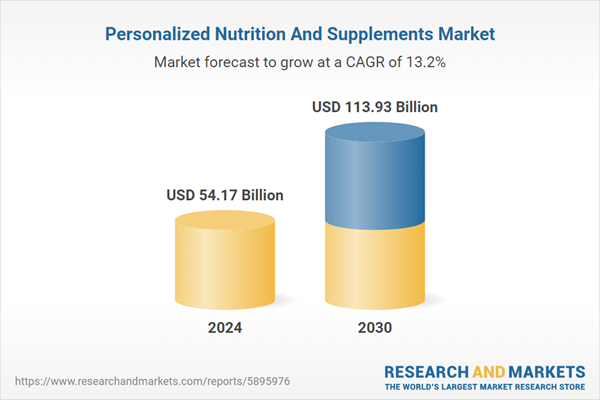Speak directly to the analyst to clarify any post sales queries you may have.
10% Free customizationThis report comes with 10% free customization, enabling you to add data that meets your specific business needs.
Fueled by rising interest in data-driven, personalized health regimens, the sector is expanding alongside growing awareness of nutrition’s role in chronic disease prevention. As the sector collects increasingly sensitive health and genetic data, compliance with data privacy regulations like HIPAA and GDPR has become essential to maintaining consumer trust. Positioned at the intersection of healthcare, digital technology, and consumer empowerment, personalized nutrition is poised to reshape the future of health engagement by delivering precise, scalable, and accessible solutions tailored to individual needs.
Key Market Drivers
Increasing Prevalence of Diet-Related Diseases
The rising incidence of diet-related diseases stands as a primary driver of growth in the Global Personalized Nutrition and Supplements Market. Obesity, diabetes, hypertension, and cardiovascular diseases are becoming widespread health concerns globally, prompting consumers and healthcare providers to seek proactive, personalized nutritional interventions. In 2022, roughly 1 in 8 individuals globally lived with obesity, with adult obesity rates more than doubling since 1990 and adolescent rates quadrupling. Concurrently, 2.5 billion adults were classified as overweight, with 890 million of them considered obese. These trends highlight the critical need for individualized nutritional strategies.Non-communicable diseases (NCDs) accounted for 43 million deaths in 2021, comprising 75% of global non-pandemic-related mortality, with a disproportionate burden on low- and middle-income countries. Personalized nutrition offers a preventive and therapeutic approach to addressing these challenges by aligning dietary interventions with individual health profiles. This strategic shift is fueling market expansion and anchoring personalized nutrition as a key component in global health strategies.
Key Market Challenges
Privacy Concerns
Privacy concerns represent a substantial hurdle in the Global Personalized Nutrition and Supplements Market due to the sensitive nature of the data involved. Personalized nutrition services often rely on genetic, biometric, and health history information to tailor recommendations. As this data is collected, stored, and analyzed, concerns arise regarding data breaches and unauthorized access.Consumers are increasingly wary of how their personal health information is being used, especially as data breaches become more prevalent. Companies must prioritize transparency, obtain clear informed consent, and implement strict data governance protocols to ensure ethical data usage. Failure to adequately protect consumer data or clearly communicate data policies may lead to diminished trust and hinder market adoption. In a landscape governed by strict privacy regulations such as GDPR and HIPAA, safeguarding personal data is not only a legal obligation but also a key to sustaining consumer confidence and long-term market growth.
Key Market Trends
Genetic Testing Integration
The integration of genetic testing is a defining trend in the Personalized Nutrition and Supplements Market. As understanding of the genetic basis for individual nutritional needs improves, genetic testing is being increasingly used to offer highly customized health and dietary recommendations. These tests identify key genetic markers linked to metabolism, nutrient absorption, and food sensitivities, enabling practitioners to design precise nutrition plans tailored to each individual's genetic profile. Consumers can receive guidance on macronutrient distribution, micronutrient requirements, and lifestyle choices aligned with their biological predispositions. This trend is enhancing the effectiveness of personalized nutrition strategies and empowering individuals to take control of their health. As genetic testing becomes more accessible and affordable, it is expected to further embed itself into mainstream nutritional services, transforming one-size-fits-all approaches into highly targeted wellness programs.Key Market Players
- Amway Corporation
- Superior Supplements Inc
- Metagenics, Inc.
- Nutralliance, Inc.
- Archer Daniels Midland Company (ADM)
- Viome Life Sciences, Inc.
- DNAFit Life Sciences Ltd
- Abbott Laboratories Inc
- Herbalife International of America, Inc.
- GX Sciences, LLC
Report Scope:
In this report, the Global Personalized Nutrition and Supplements Market has been segmented into the following categories, in addition to the industry trends which have also been detailed below.Personalized Nutrition and Supplements Market, By Ingredient:
- Proteins & Amino Acid
- Vitamins
- Minerals
- Probiotics
- Herbal/Botanic
Personalized Nutrition and Supplements Market, By Dosage Form:
- Tablets/Capsules
- Liquids
- Powders
- Other
Personalized Nutrition and Supplements Market, By End Use:
- Supermarkets/Hypermarket
- Specialty Stores
- Retail Pharmacies
- Online Pharmacies & E-Commerce Sites
Personalized Nutrition and Supplements Market, By Region:
- North America
- United States
- Canada
- Mexico
- Europe
- France
- United Kingdom
- Italy
- Germany
- Spain
- Asia-Pacific
- China
- India
- Japan
- Australia
- South Korea
- South America
- Brazil
- Argentina
- Colombia
- Middle East & Africa
- South Africa
- Saudi Arabia
- UAE
Competitive Landscape
Company Profiles: Detailed analysis of the major companies present in the Global Personalized Nutrition And Supplements Market.Available Customizations:
With the given market data, the publisher offers customizations according to a company's specific needs. The following customization options are available for the report.Company Information
- Detailed analysis and profiling of additional market players (up to five).
This product will be delivered within 1-3 business days.
Table of Contents
Companies Mentioned
- Amway Corporation
- Superior Supplements Inc
- Metagenics, Inc.
- Nutralliance, Inc.
- Archer Daniels Midland Company (ADM)
- Viome Life Sciences, Inc.
- DNAFit Life Sciences Ltd
- Abbott Laboratories Inc
- Herbalife International of America, Inc.
- GX Sciences, LLC
Table Information
| Report Attribute | Details |
|---|---|
| No. of Pages | 185 |
| Published | April 2025 |
| Forecast Period | 2024 - 2030 |
| Estimated Market Value ( USD | $ 54.17 Billion |
| Forecasted Market Value ( USD | $ 113.93 Billion |
| Compound Annual Growth Rate | 13.1% |
| Regions Covered | Global |
| No. of Companies Mentioned | 10 |









